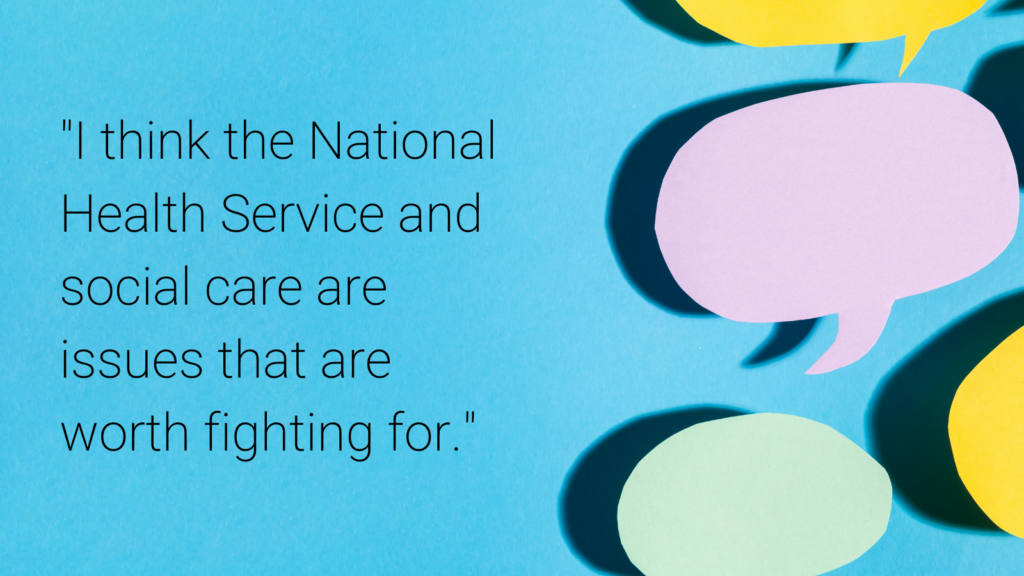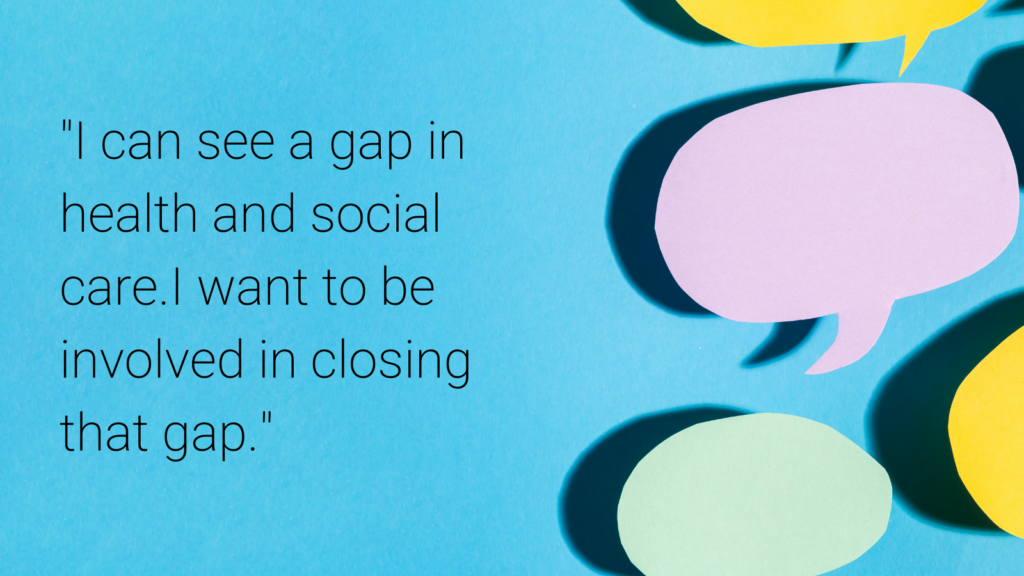Welcome to the first of our three part series taking you inside The People’s Panel on health and care.
About the Panel
The People’s Panel brought together members of the public to consider the health and care challenges being faced by people across the country. The Panel got to call on experts – by both profession and lived experience – to answer any burning questions and help them prioritise the issues raised.
In this three part series, you’ll get to hear what happened through the voices of the Panel members and guest speakers. Scroll down to be a fly-on-the-wall as they tackled the country’s number one issue: How can we make sure everyone gets the health and care they need – and how can we fund it?
What Part 1 covers:
- What is The People’s Panel?
- The Panel’s role
- Hearing from guest speakers
- Involving the public: ‘We owe it to the people of this country’ (Sir Norman Lamb)
- Adult social care: ‘We haven’t thought through the consequences’ (Richard Humphries)
- How the NHS works: ‘Making sense of our experiences’ (John Hall)
- Panel members: ‘Sharing my own health and care experience’
- The Panel’s reflections
What is The People’s Panel?
The People’s Panel on health and care represented Britain in miniature. Members of the public were brought together from all walks of life, reflecting the views of people in England, Scotland and Wales.
The Panel’s role was to listen, to discuss and to prioritise: what health and care issues matter most to people? And what needs tackling first? Here’s how Debbie, one of the Panel members, described it:
The Panel’s role
In the months leading up to the Panel, over 700 people across Britain came together to have Community Conversations. These online discussion groups gave the public a chance to share their health and care experiences – what they felt was working well and what could be better. That’s where the Panel came in: to listen to all these viewpoints, alongside talks from experts in the sector, and prioritise the most important changes that needed looking at.
‘Why I joined The People’s Panel’

Harry, Panel member

Rosemary, Panel member

Hazel, Panel member
Hearing from guest speakers
Over the first couple of days, the Panel got to hear from a handful of health and care experts. They helped to give a whistle-stop tour of how things really work in the NHS and social care.
Involving the public: ‘We owe it to the people of this country to do much better’
(Guest speaker: Sir Norman Lamb, former Health Minister)
Panel members also had the opportunity to speak to Sir Norman Lamb directly. Their questions included:
- Is it possible to join up physical health with social care?
- Could we tax highly paid individuals and multinationals?
- Staff are underpaid. How can that change when the government allowed it to happen?
Read the Panel’s first-hand experiences of these issues >
SIR NORMAN LAMB (former Health Minister): I would like to see us bring health and social care together into a coherent, single service. And for the power to be held within localities, so they determine how things should be run. We also need to be better at supporting ourselves, in terms of our own health.
And I would make the case for treating people holistically. Many people have both physical and mental health needs. So it’s important to make sure they they are treated as a whole person.
Adult social care: ‘We haven’t thought through the consequences’
(Guest speaker: Leire Agirre, Principal Social Worker, Central Bedfordshire Council)

LEIRE AGIRRE (Principal Social Worker): We’re talking about social care a lot at the moment because of a great success story in our time: we’re living longer that we’d ever imagined.
So we ought to celebrate the fact that more of us are living to an age that we do need some support. That’s the good news.
The not so good news: As a society we just haven’t thought through the consequences of what that means. What kind of care and support are we likely to need? How should that be organised? Who should provide it? And, critically, how shall we fund it?
Successive governments of all political colours have fluffed that one and kicked it into the long grass.
This is an issue that affects all of us. Not some minority who are unlucky.
RICHARD HUMPHRIES, TRUSTEE, ASSOCIATION OF DIRECTORS OF ADULT SOCIAL SERVICES
How the NHS works: ‘Making sense of our experiences’
(Guest speaker: John Hall, Healthcare adviser, former Strategy Director at the Department of Health)
JOHN HALL (Healthcare adviser): Does the type of health and care experience you have just come down to good luck or bad luck? Sometimes I think it is. But sometimes it’s about how the system works – or whether it’s in Wales, Scotland or England. So I’m going to describe some of the big changes that are affecting the health system in all three of the countries:
Start with what you think great health and care should look like.
JOHN HALL, HEALTHCARE ADVISER
Panel members: ‘Sharing my health and care experience’
The Panel was split into breakout groups for an opportunity to look a little closer to home: what were their own personal health and care experiences?
When the groups later gathered together as one, three themes had risen to the top:
- Inefficiencies and waiting times
- Workforce
- Prevention and responsibility of the individual
Read about the Panel’s own health and care experiences >
The Panel’s reflections
JULIE (Panel member): “I was impressed that they had someone so experienced and high up as Sir Norman Lamb come and talk to us. I hadn’t thought about politicians being just as frustrated as we are. It really struck a chord. I could feel how much he wanted to do.”

